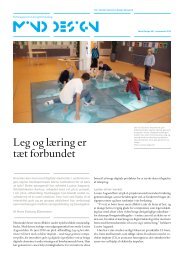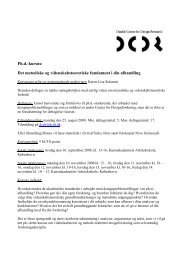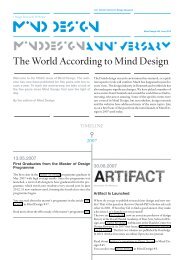Play-Persona: Modeling Player Behaviour in Computer Games
Play-Persona: Modeling Player Behaviour in Computer Games
Play-Persona: Modeling Player Behaviour in Computer Games
Create successful ePaper yourself
Turn your PDF publications into a flip-book with our unique Google optimized e-Paper software.
players can choose between different identically optimal strategies to progress <strong>in</strong> the game. In this<br />
case, play-personas represent a design tool, an expectance of how players would like to behave <strong>in</strong><br />
the game environment and approach the game goals. Designers can use these categories of<br />
behaviors as a guide dur<strong>in</strong>g design. This prior to a playable version of the game (e.g. before the<br />
beta-stage) <strong>in</strong> order to design for coherent navigation and <strong>in</strong>teraction modes, dist<strong>in</strong>guish<strong>in</strong>g<br />
between different ways of play<strong>in</strong>g the game and expected experiences.<br />
2) Designer synthetic lens: Alternatively, metrics can form the basis of def<strong>in</strong><strong>in</strong>g data-driven<br />
personas dur<strong>in</strong>g game test<strong>in</strong>g. <strong>Persona</strong>s based on PC-metrics can be used as tools when evaluat<strong>in</strong>g<br />
demos or prototypes (i.e. conduct<strong>in</strong>g user-research), or even post-launch (especially important to<br />
MMOGs and other onl<strong>in</strong>e/persistent games), compar<strong>in</strong>g the goals set by the designers with those of<br />
the players. That is, answer<strong>in</strong>g the question about whether the game design actually supports and<br />
facilitates the planned personas <strong>in</strong> practice, and if any new personas emerge from the user-<br />
<strong>in</strong>teraction with the game software. Game metrical data can form a way of discover<strong>in</strong>g patterns <strong>in</strong><br />
the usage of PC elements and features, thus enabl<strong>in</strong>g the build<strong>in</strong>g of personas of how players<br />
<strong>in</strong>teract with the game, and whether the game design facilitates the specific play patterns of the<br />
personas.<br />
3) <strong>Play</strong>er hypothetical metaphor: Similarly, personas can be released to players (e.g. <strong>in</strong> the form of<br />
narrative descriptions) or even created by players based on their expectations of the game, as<br />
models for the expected experience of play<strong>in</strong>g (e.g. as <strong>in</strong>dicated by the title Hitman: Silent<br />
Assass<strong>in</strong>). If games are about realiz<strong>in</strong>g fantasy, this type of persona is the preferential fantasy that<br />
a game is sold upon.<br />
4) <strong>Play</strong>er synthetic lens: When play<strong>in</strong>g the game or afterwards, dur<strong>in</strong>g reflection on the experience<br />
of play, players can form mental constructs (consciously or not), which players can build to unify<br />
their own actions and to make sense of the game world and the experience of <strong>in</strong>teract<strong>in</strong>g with it. In<br />
this context personas are the implied narrative tool of player. Irrespective of whether personas are<br />
developed prior to a testable prototype, or after players actually get to play the game; and<br />
irrespective of whether personas are developed by players or designers, they can be def<strong>in</strong>ed based<br />
on variables expressed as metrics, even if actual metrical data cannot be gathered until after a<br />
testable prototype is complete. The def<strong>in</strong>ition and group<strong>in</strong>g of specific sets of player behaviors via<br />
metrics are generally strengthened by other sources of quantitative as well as qualitative data<br />
[10,16], or alternatively as mentally derived constructs.<br />
139















